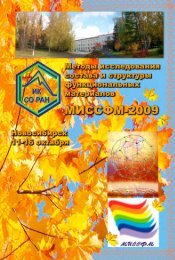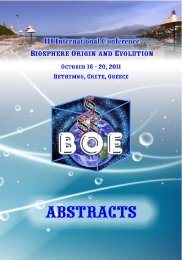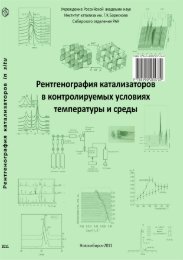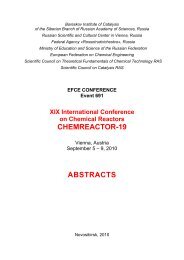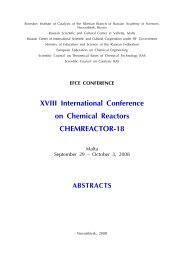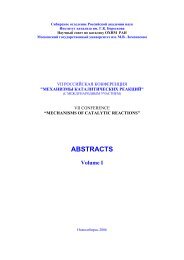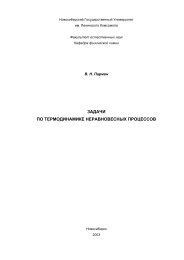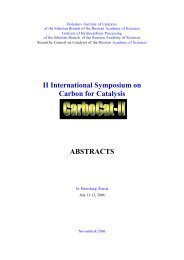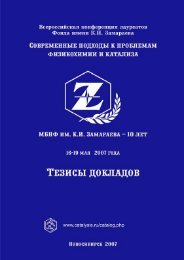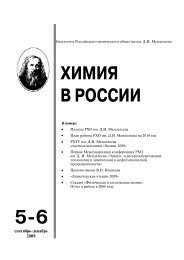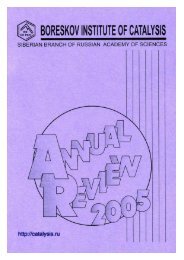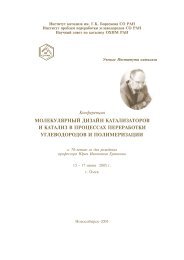Boreskov Institute of Catalysis SB RAS, Novosibirsk, Russia
Boreskov Institute of Catalysis SB RAS, Novosibirsk, Russia
Boreskov Institute of Catalysis SB RAS, Novosibirsk, Russia
- No tags were found...
Create successful ePaper yourself
Turn your PDF publications into a flip-book with our unique Google optimized e-Paper software.
PP-13HYDROCONVERSION OF VEGETABLE OILS INTO HYDROCARBON-BASED BIODIESEL OVER NONSULFIDED CATALYSTS:A COMPARATIVE STUDY OF METAL CATALYSTSSUPPORTED ON BORATED ALUMINAChumachenko Yu., Lavrenov A., Skorpluk A., Drozdov V.,Gulyaeva T., Arbuzov A., Buyalskay K., Kudrya E.<strong>Institute</strong> <strong>of</strong> Hydrocarbons Processing <strong>of</strong> <strong>SB</strong> <strong>RAS</strong>, <strong>Russia</strong>, Omsk,Neftezavodskay, 54, Fax +7-3812-64-61-56, E-mail: lavr@ihcp.oscsbras.ruHydrocarbon diesel fuels produced from vegetable oils do not yield to the bestsamples <strong>of</strong> oil origin fuels in combustion value and low-temperature properties. Theygreatly surpass them in cetane characteristics and environmental safety at theexpense <strong>of</strong> practically full absence <strong>of</strong> sulfur compounds and aromatic components.The employment <strong>of</strong> sulfided catalysts by hydroconversion <strong>of</strong> neat vegetable oilsrequires the addition <strong>of</strong> sulfur-containing compounds in the process for keeping <strong>of</strong> thecatalyst activity and lifetime. In the framework <strong>of</strong> this paper for development <strong>of</strong>catalyst <strong>of</strong> vegetable oils processing into hydrocarbon diesel fuels it is first suggestedto examine bifunctional catalytic compositions based on Pt, Ni, Co, Mo, W-containingsystems with B 2 O 3 -Al 2 O 3 as a solid-acid support. The catalysts were characterized byBET method, XRD, FTIR, UV, TPR H 2 , TPD NH 3 , CO chemisorption. The catalystscreening is carried out in fixed-bed reactor in H 2 atmosphere under constanttemperature (400°C), pressure (4 MPa) and WHSV <strong>of</strong> sunflower oil (5 h –1 ). It isshown, that on all catalysts, including initial support, decomposition <strong>of</strong> vegetable oilproceeds with yield <strong>of</strong> liquid products about 70-85 wt%. Hydroconversion <strong>of</strong>triglycerides, containing in vegetable oil most efficiently proceeds on Pt and Nicontaining catalysts. For both catalysts heavy cycloalkanes and arenes, and alsoalkanes with number <strong>of</strong> carbon atoms in molecule up to 35 are found in liquidhydrocarbon products. They are products <strong>of</strong> side reactions <strong>of</strong> cyclization,aromatization and condensation. Thus, established level <strong>of</strong> jet and diesel fuel in liquidproducts does not exceed 63 wt%. Selective conversion <strong>of</strong> vegetable oils intoalkanes is achieved at 350°C and 4 MPa over a 0.5 wt% Pt catalyst. The resultsshow that platinum catalyst gives a 78% yield <strong>of</strong> liquid products. It is determined thatliquid products contain mostly alkanes C 17 and C 18 (up to 53 and 35.3 wt.%respectively). Furthermore, the gas-phase analysis demonstrates that thedecarboxylation and decarbonylation reaction are more pr<strong>of</strong>ound over this catalyst.102




